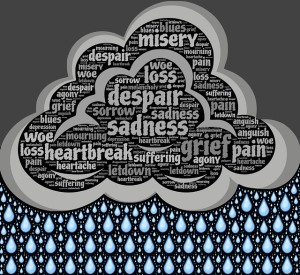A Non-Attachment Approach to Avoiding Emotional Drama
“Most of our troubles are due to our passionate desire for and attachment to things that we misapprehend as enduring entities.” ~Dalai Lama …
As social beings, sooner or later we will be exposed to, and possibly subjected to the drama of other people. When we can maintain our social awareness, we can avoid this pitfall of societal interaction by detaching ourselves with compassion. Compassionate Detachment, often known as non-attachment, is a skill that helps us in our interactions by acting as a buffer between empathy and communicative awareness. This skill helps us to protect ourselves from being drawn into the energy drain of drama and preserves our affability.
Have you ever noticed how you can be engaged in conversation with a friend or two, laughing, talking, and having a good time; your vibe is very positive basking in the joy of the energy of your friends and then, out of nowhere, another person enters the conversation and the vibe suddenly changes? The new person to the conversation begins to speak ill of his or her job, family, mutual friends, love life, or something else that brings a dark cloud to your bright and sunny day. The next thing you know, the entire group of people is engaging in rumors, slander, and total drama. There is always one in every crowd. You can avoid this happening by practicing a non-attachment approach.
Have you ever wondered why this happens?
Your Emotionally Draining Friend. Now you really need non-attachment!
Another example might be the friend who always calls you on the phone to use you as a sounding board for all of their problems. Because you try to be a good friend, you listen and try to offer advice, but by the end of the conversation, your emotional level is low. You are tired and drained and just want to hang up on them. These types of people suck the life right out of you. The next thing you know, you are worried about your own issues, begin to question the very things in your own life that you were advising your friend against. You have become polarized and need to detach.
Detaching ourselves from our emotions can be a very difficult process. For the vast majority of people, each day is another opportunity to ride the emotional roller coaster. When things go our way, we are happy. When they don’t, we react with anger, sadness, fear, disappointment, frustration, resignation, or any other emotional response that you can assign a negative vibe toward. In fact, we are typically so accustomed to experiencing these emotions that we believe our lives will always be marked by emotional reactions to the challenges we experience. We tend to let ourselves believe that this is “normal” and everyone does it. This is where the practice of non-attachment can be an emotional life saver.
We tend to let ourselves belief that we are emotional beings reacting to situations and circumstances beyond our control. This misconception is so ingrained in us that we usually do not even see the possibility of living without immediate emotional responses. How many times have you heard people say “We are human beings and we’re entitled to our emotions?” By coming from the perspective that we will always be at the mercy of things that people say or do, we forfeit our ability to retain control of our emotional well-being. So how do we cultivate non-attachment and detach ourselves from always living on our emotions? Before we answer that question, let’s examine the cause.
What Causes Us to React With Emotion?
The cause is attachment. Attachment, the way I am using it here is defined by Merriam-Webster as “strong feelings of affection or loyalty for someone or something”. When we allow ourselves to become attached, or overly attached to someone or something, the sudden absence causes us to panic and react in the ways mentioned above. Then we experience the feelings of anger, sadness, fear, disappointment, frustration, and resignation.
The best way to detach is to allow yourself to experience people and situations without attachment in the first place. If you can learn non-attachment, you can find bliss in the moment and allow joy without fear. Okay… so “How do we do that?” you ask.
How to practice non-attachment
Here are some tips that I follow when I recognize that I should not attach to something. I am going to throw in something to remember… As human beings, we are inevitably going to attach from time to time. No one is perfect at preventing attachment, so be easy with yourself.
- Accept the moment - Don’t dwell on the past; that moment is gone, never to return. You cannot get it back. Do not try to make the moment last forever. Just enjoy it because it will eventually pass out of your life. Nothing is permanent because vibrational energy changes, people shift in and out, and everything is fluid. Thinking of the past or the future will only cause you pain.
- Believe now is enough - Now is all we have…tomorrow will not be the same as today, no matter how much you try to control it. A relationship might end or you might have to move. Realizing that all you need is now will allow you to appreciate and enjoy what you have.
- See Yourself Objectively - Be mindful of your thoughts and feelings when they veer toward attachment; they can betray you. When you dwell on keeping, controlling, manipulating, or losing something instead of simply experiencing it, you bring yourself worry. Worry leads to anxiety and anxiety leads to pain.
- Define Yourself Realistically - We are constantly evolving and growing. Define yourself in terms that can withstand change. Do not define yourself by possessions, roles, and relationships. Doing so breeds attachment and a loss will result in not only losing what you have, but also who you are.
- Enjoy Now - No matter how much time you have in an experience or with someone you love, it will never feel like enough. So don’t think about it in terms of quantity or time invested. Aim instead for quality. Attach to the idea of living well moment-to-moment. That attachment can do you no harm.
So what do we do if we fail to experience without attachment? What do we do if we are experiencing a perceived loss to which we have already attached ourselves? How do we stop the snowball effect of emotions and anxiety to come? There are some techniques to help.
Emotional Detachment Techniques to achieve non-attachment
- Spiritual Breathing - Taking a deep breath will help you to detach your emotions from a situation. When you are emotionally stressed, holding your breath is your body’s way of coping, but this will cause the effects to be worse.
- Neutralize Your Thoughts - Neutralizing your thoughts toward the negative actions or words of others is another good non-attachment technique. By clearing your mind from the current behavior or situation, you can detach in a healthy manner.
- Journaling - Keeping a journal is another way to help detach emotionally. By tracking the actions of others and writing them down, you can see how you have allowed their actions to negatively influence your life and take the steps needed to detach.
- Recognize you self-worth - You are always feeling what you think. You are not necessarily always feeling “the truth,” or even your own personal truth. Every emotion, feeling, or mood you experience follows directly from the thinking you are experiencing. That thinking is not always accurate or important. It does not always indicate what’s best for you. In reality, your feelings are nothing more than feedback about your thinking. Feelings are not feedback about your mental health, the state of your life, or whether you have the “right” job, partner, or dietary habits.
- Do Something Different - Step out of your comfort zone. One of the benefits of non-attachment is not having to compromise. Go to a hockey game, attend the ballet, or stay up late watching old movies. Use engaging, healthy activities as a way to replace your emotional attachment to the loss you are experiencing.
My mother used to tell me that an ounce of prevention is worth a pound of cure. When it comes to detaching from people, things, or situations, it is better to never over-attach in the first place. When we become overly attached to someone or something, the possibility of loss leads to fear. Fear leads to suffering. Practicing non-attachment techniques before becoming attached emotionally is more effective than having to detach ourselves after the event!
Listen to Joe’s interview with Lorane on the radio
Joe Vulgamore PCP CBI
Empowerment Coach
Connect with Joe
Website: http://www.joevulgamore.com/p/welcome.html


[…] Seriously, we all want to be a “good” friend but dementors don’t really want advice. They want to moan and it is pretty hopeless trying to get them to change. If you have a sneaky suspicion you might be a bit of a dementor on occasions, then read this guest blog for some advice…. http://loranegordon.com/yourhappinessway/non-attachment/ […]